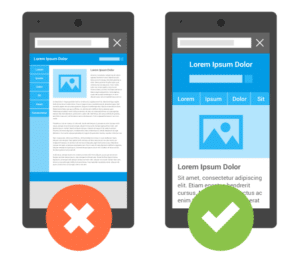The Importance of Mobile-Friendly Websites
A few years ago (April 21, 2015 to be exact) Google changed the way businesses big and small – all over the world – marketed to potential customers. It was called Mobilegeddon and it instantly placed the importance of mobile-friendly websites ahead of their desktop counterparts. In short, here’s why:
- More people surf the web on mobile devices than desktop
- Smartphones are sophisticated enough to deliver the same browsing experience as desktops or laptops
- A good user experience – no matter on what device – is more important than ever
For years, the importance of mobile websites was always secondary. Trying to squish a big desktop website onto a small screen was just par for the course. But, on April 21, 2015, that all changed.
 What was Mobilegeddon, exactly?
What was Mobilegeddon, exactly?
According to Wikipedia:
-
“The main effect of (Mobilegeddon) is to give priority to websites that display well on smartphones and other mobile devices.”
That’s a fancy way of saying if you don’t have a mobile optimized website, Google will punish it in the search rankings. Google’s primary function is to serve up relevant content to your search. So if you type in “how to hire a contractor”, you expect to get a result that answers your question. With Mobilegeddon, the usability of a website on a mobile device is just as important as the content. If on mobile, the website:
- Doesn’t load properly
- Is too hard to navigate
- Has pictures which are too big
Google won’t give it a favourable ranking compared to a mobile-friendly website. Again from Wikipedia:
“The desktop version of a site might be difficult to view and use on a mobile device.”
That used to be acceptable. But after Mobilegeddon, it no longer is.
How does YOUR website measure up against your top competitors?
Find out for sure with a FREE Competitive Website Analysis
Is your website mobile friendly?
To be blunt: it better be. The mobile-friendliness of a website will contribute to its Google ranking, just like keywords and other standard search engine optimization factors do. Now, when Google launched Mobilegeddon, it put together a list of easy-to-follow rules on how to make a website mobile friendly:
It uses software that’s compatible with mobile technology
- EXAMPLE: Let’s say you’re a home builder with a Flash video of your model homes. Flash does not work on mobile, therefore your site is not mobile-friendly.
Large, readable text without zooming
- EXAMPLE: If you’re a building or landscape supplier with a price list on your desktop website, that same list must appear on mobile without needing to adjust text size.
Content automatically resizes to fit the screen (so you don’t have to scroll horizontally)
- EXAMPLE: Scrolling up and down to read a long, informative blog is fine. Scrolling left and right because sentences get cut off is not a mobile-friendly experience.
Large links with plenty of space between so they are easily tapped
- EXAMPLE: Your B2B website catalogue must have enough room between items so they users can click on what they want to see (and not accidentally click the wrong item).
Not sure if your website is mobile-friendly?
Google has a free tester which can tell you. Here’s what the results look like, using the WEB ROI website as an example:
Why the importance of a mobile-friendly website matters
You’re an entrepreneur.
As a business owner, you want to promote your company and attract as many customers as possible. Because more people browse the web on mobile devices than traditional computers, there’s a good chance that’s where they’ll go to find you. Therefore, it would be a shame if their first impression of your business is a mobile website which:
- Takes too long to load
- Doesn’t look right at all
- Has information that’s hard to read or access
Here’s another way to look at it: Say you have 100 people looking for your services online and 60 of them are doing so from an iPhone. If your website isn’t optimized for mobile, you’ve instantly alienated and turned away 60% of potential new customers. Even worse: They won’t come back.
Other things you should know

- Mobile-first ranking: If you have a poor mobile website, guess what? The desktop version (no matter how awesome it is), will suffer in the rankings too.
- Speed matters: People searching on a mobile device are impatient. Your mobile website has to fully load within 3 seconds. A slow mobile website will hurt your SEO results.
- More changes are coming: Google is always making updates to its program which can impact everything from website rankings to how you measure results and ROI.
Don’t ignore the importance of mobile-friendly websites any longer
In 2017, it does not matter what industry your business is in. You simply must have a website that’s optimized for mobile. If you don’t, you risk falling behind your competitors who already recognize the importance of mobile-friendly websites (and are taking advantage of it). WEB ROI can help you get started.
- CONTACT US for a FREE, no obligation introductory chat about your digital marketing needs
- GET A FREE COMPETITIVE WEBSITE ANALYSIS and see how you stack up against your competition
- DOWNLOAD YOUR FREE COPY of 6 Guaranteed Ways to Drive More Qualified Leads.

 What was Mobilegeddon, exactly?
What was Mobilegeddon, exactly?
